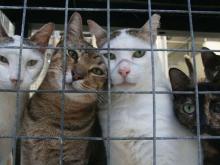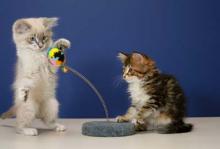5 Reasons Why Cats are Better than Dogs
- Cats make better space heaters. There is nothing like a cat on your lap or curled up next to you in bed to help keep you warm. Cats are soft and comfortable when used for this purpose, whereas dogs tend to kick and stick their feet straight out so that they take up the whole bed if you don't watch out. Also, there seems to be a rule with dogs that if they are small enough to fit in your lap, they have to be too vicious to cuddle.
- Cats don't harass you to go outside every 5 minutes. And if yours do, please see my post about why cats should be kept indoors.
- Cats don't need as much attention. In fact, many cats would rather not have so much attention. They don't harass you to play with them, take them for walks, give them treats, or whatnot. Most of the time they are fairly independent, but if you're lazing around wanting someone to cuddle with you, chances are they are up for that!
- Cats can take themselves potty. You don't have to make sure to let your cats outside to go to the bathroom regularly like you do with dogs. Just give them a litter box and they are fairly self-reliant. All you have to do is remember to clean it.
- Cats don't bark. Usually.
What about you? Do you prefer cats, and why?







